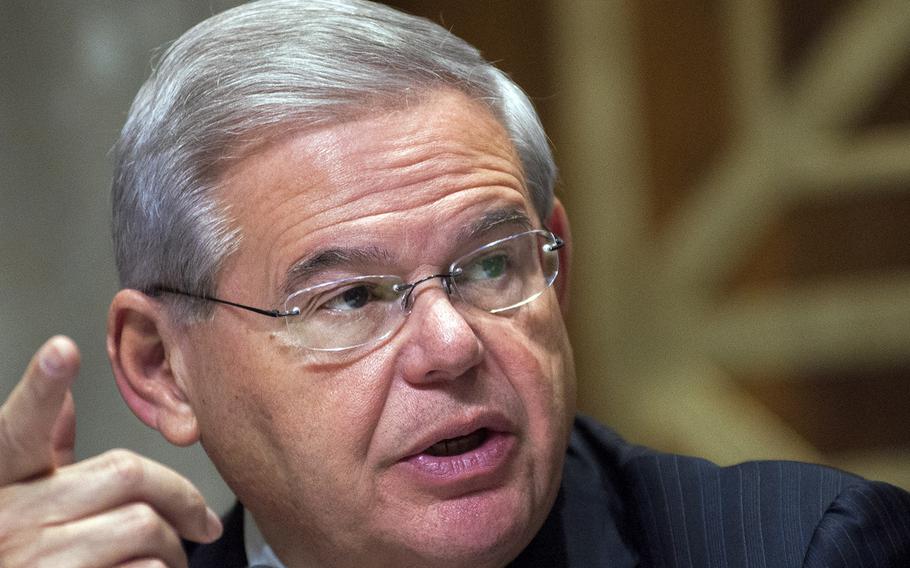
Sen. Robert Menendez, D-N.J., Chairman of the U.S. Senate Committee on Foreign Relations, discusses a proposal to authorize the limited use of U.S. armed forces against the Islamic State militant group during a session on Capitol Hill in Washington on Thursday Dec. 11, 2014. (Carlos Bongioanni/Stars and Stripes)
WASHINGTON — A Senate panel approved a war powers bill Thursday limiting the Obama administration’s ability to use ground troops against the Islamic State.
Senators on the Foreign Relations Committee who pushed to impose limits on military operations in Iraq and Syria said they feared another open-ended conflict following 13 years of war following 9/11. But many — mostly Republicans — said ruling out such forces may hinder the nation’s ability to defeat the extremists.
The bill is likely to die as Congress prepares to end its session this week. But the 10-8 vote was the first indication of how lawmakers may eventually weigh in on a new authorization for the use of military force, which many on Capitol Hill believe is necessary.
“Let’s be honest, I don’t think we would have gotten anybody to crystalize their ideas … unless we started this process,” said committee chairman Sen. Robert Menendez, D-N.J.
The bill would prohibit President Barack Obama from deploying large-scale ground forces for combat but makes some exceptions. The troops could be sent in to rescue Americans, collect intelligence, direct airstrikes and conduct operations planning.
“The massive deployment of ground forces in the Middle East ends up creating more enemies than it ends up killing,” said Sen. Chris Murphy, D-Conn. “I think that is an air-tight, take-it-to-the-bank lesson from over the past 10 years.”
The authority of the president to wage war would also expire after three years, meaning the Congress would be required to revisit the conflict following the election of the next president.
Sen. Rand Paul, R-Ky., tried to insert an amendment limiting the war to within the geographic boundaries of Iraq and Syria, but the measure failed.
The bill would allow strikes against the Islamic State and associated groups, and Paul noted it could be interpreted as an authorization to strike at up to 60 radical groups in 30 nations.
“There is tendency for executives from both parties to abuse these resolutions and make them mean anything they want,” he said.
Fellow Republicans rejected limitations on the war effort through the authorization for the use of military force, saying the decision on ground troops should be left up to the president and military commanders.
“I agree with everyone who says we really don’t want to use ground troops there,” said Sen. Jeff Flake, R-Ariz. “It is fine for the president to say it. He can change his mind any time he warrants it, but putting [a restriction] in an AUMF is not the way to go.”
Secretary of State John Kerry testified before the Senate on Tuesday and requested that the chamber leave the option for ground troops open. Obama has continued to maintain he will not allow another land war in Iraq, but commanders have signaled it may be necessary to defeat the Islamic State.
“Why would we authorize the use of force if we are not fully committed to victory?” said Sen. Ron Johnson, R-Wis.